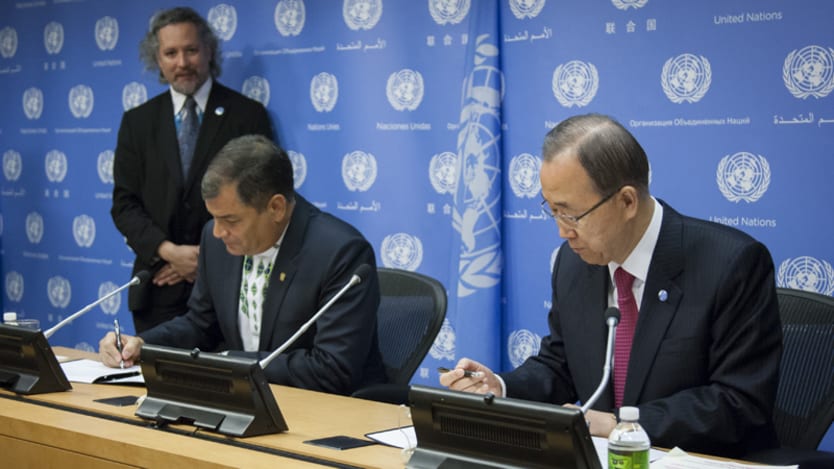
When representatives from 193 countries assemble in Quito, Ecuador, this October for Habitat III — the third United Nations Conference on Housing and Sustainable Urban Development — their job will be to sign off on a New Urban Agenda outcome document that will shape the world’s approach to rapidly accelerating urbanization over the next two decades.
Coming barely a year after the adoption of the Sustainable Development Goals, the summit represents a huge opportunity for national and local governments, civil society organizations and the development community at large to forge a way toward helping cities cope — and thrive — as their populations expand, while ensuring that the urban poor share the benefits of progress.
Why cities matter
The U.N. predicts that by 2050, 70 percent of the world’s populations will live in cities. However, the scale and pace of urbanization, especially across Africa and Asia, is happening far faster than the response, said William Cobbett, director of Cities Alliance, a global network focused on urban poverty alleviation. This is exacerbating huge backlogs in cities’ ability to provide their citizens with basics such as housing.
“In the most extreme examples, small and medium cities will typically double in size in about 15 years,” he told Devex. “That’s easy to say but difficult to manage.”
While the East Asian model, exemplified in Vietnam and China, has been to use cities as an economic driver, many African states regard urbanization as a challenge that needs to be slowed, said Cobbett. But with around 65 percent of all African urban growth a result of natural population growth rather than migration from the countryside, the growth of cities is not something that can be stopped in its tracks.
Discussions in Quito should therefore focus on creating a framework that encourages national governments to create policies aimed at embracing urbanization as an economic opportunity, Cobbett said.
Delivering a new urban agenda for development
Devex interviews Frédéric Bontems, director for sustainable development at the French Ministry of Foreign Affairs and International Development, to learn what we can expect from Habitat III and the New Urban Agenda.
Building on the SDGs
Habitat III represents a unique opportunity to ensure that the SDGs related to urban issues gain prominence and are implemented properly. Indeed, one of the 17 SDGs is to make cities inclusive, safe, resilient and sustainable, while other goals — such as those related to water and energy — will also have to be delivered at the local or city level.
Many of the issues addressed in the SDGs “stem from having a decent place to live,” said Christopher Vincent, vice president for government relations and advocacy at Habitat for Humanity International. “Adequate and affordable housing supports many of the other goals including economic growth, gender equality, access to water and sanitation and clean energy. How can you talk about someone’s health if he or she is living with a leaky roof and a dirt floor?”
Although the priority given to urban issues in the SDGs is positive, there are many issues — such as who has the mandate to do what — that have not yet been tackled, said Emilia Saiz, deputy secretary general of United Cities and Local Governments, a network of cities around the world.
Habitat III’s focus on issues of government decentralization will therefore be key to UCLG. Said Saiz: “We need to address that in Habitat III if we want [the] 2030 [Agenda] to be implemented.”
Housing: A platform out of poverty
Housing — along with the related issue of security of land tenure — is a platform for strength, stability and well-being among residents and their communities, and therefore needs to be the center of the New Urban Agenda, said Vincent.
Housing is fundamental to achieving many of the SDGs, and is not just about shelter, but about “security and permanence,” agreed Don Chen, director of equitable development at the Ford Foundation.
Residential security is a good economic investment in terms of financial, social and environmental returns, helping to strengthen the social safety net and deliver better health and education outcomes and access to jobs, he said.
“Housing is the platform from which families move out of poverty, from which children get education and families access health care,” agreed Ron Terwilliger, former CEO at U.S. housing developer Trammell Crow Residential and the former chairman of Habitat for Humanity. “Each country needs to decide what their responsibility is for housing their citizens.”
What role for the private sector?
Developing strategies to galvanize the private sector will be another key objective in Quito.
There is of course already a tendency among governments to delegate housing provision to the private sector. However, for the private sector to create safe, suitable and affordable housing for the people who need it, governments must implement good housing policies, inject funding and create an attractive investment environment.
High construction costs in many countries make it impossible for private companies to build affordable housing for lower-income families at a profit. Governments must therefore provide support such as free land, tax cuts or lower-cost loans, said Terwilliger, adding that private sector builders cannot serve lower-income households without some kind of government subsidy.
“That’s what I hope the nations at Quito will come to grips with,” he said. “The private sector, in the U.S. and, I suspect, around the world, is waiting to be called on, but needs the help of governments in being able to provide the housing that lower-income people need.”
For a city to be successful, it also needs to attract structured, long-term national and international investment, said Cobbett.
Investment capital, however, is “fickle and mobile,” requiring consistent, stable, determined policy frameworks that tell investors they’re not going to lose their money.
Governments should therefore stop working to prevent the development of slums and instead link them to transportation, sewage systems and other essentials, he said, adding that this will help attract formal private investment so they can become regular suburbs.
Empowering local governments
One critical issue for sustainable urbanization that is being addressed by Habitat III is the dynamic between national and local governments and how power and responsibility — both for driving the urban agenda and implementing change — should be divided up.
Although the provision of urban services such as housing or energy is typically administered by local governments, national governments often drive decision-making in these areas. Habitat III may help change that.
Cities have in recent years assumed a role that was previously reserved for states. Local governments have gone from being mere administrative bodies to become key actors in the production of policies as well as in generating responses to global challenges, said Ada Colau, mayor of Barcelona.
“Where states fail, cities provide and coordinate solutions to guarantee rights, sharing what they have learned, and have an impact on government at multiple levels,” she said, adding that they do this across a range of fields, including the reception of refugees, the fight against climate change and the right to housing.
Local authorities are uniquely placed to identify and meet the needs of city dwellers, agreed Khalifa Sall, mayor of Dakar.
“We must be involved directly and systematically in all stages of development, from conception to implementation of assessment policies and answering efficiently to the demands of citizens,” he said. “That is why our role in Habitat III and in the implementation of Agenda 2030 is key.”
Local and regional governments are keen for Habitat III to resurrect and build on the spirit of decentralization and local government partnership that emerged during Istanbul’s Habitat II conference in 1996.
The current climate of increased tensions and armed conflicts is, however, distracting national governments, with many shifting their focus to security issues, said Saiz.
While cities or local authorities will never take the place of national governments, they do need a place at the table on global initiatives such as Habitat III, she said. Guaranteeing all citizens “the right to the city — to an accountable government, to open decision-making — needs to be the breakthrough in Habitat III.”
But not all local and city governments are getting it right. Some are unwilling to formalize the provision of land, energy or water to slum dwellers out of fear that it will legitimize settlement, noted Cobbett.
That creates a market for slumlords who control the supply of basics such as water or security, for which the poor pay more than the middle class to whom it is formally provided. This parallel market also robs local authorities of potential tax revenues, he said.
More high-level political support needed
Habitat III has the potential to become a seminal moment in how urbanization is approached and its challenges addressed. To have a real impact, however, the New Urban Agenda needs to include measurable results and specific recommendations, said Vincent. “The risk is that it’s aspirational without much accountability.”
The biggest challenge will be garnering the high-level political support that is needed for the conference — which is held only every 20 years — to result in true transformation. The seriousness with which national governments approach the summit will become apparent in the coming months.
What do you want to see on the #NewUrbanAgenda? Over the next six months Habitat for Humanity, Cities Alliance and Devex will join forces to explore the future of our increasingly urbanized world in the run up to Habitat III in October. Spread the word, share your views below or tag @devex and #NewUrbanAgenda.








